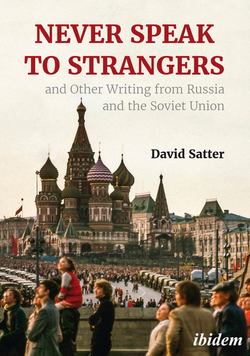Читать книгу Never Speak to Strangers and Other Writing from Russia and the Soviet Union - David Satter - Страница 40
На сайте Литреса книга снята с продажи.
ОглавлениеERZEUGT DURCH JUTOH - BITTE REGISTRIEREN SIE SICH, UM DIESE ZEILE ZU ENTFERNEN
Financial Times, Tuesday, August 5, 1980
How the Kremlin Kept Moscow Under Wraps
The 1980 Moscow Olympic Games were for long the focus of the most varied hopes and expectations. The games have now passed into history as an athletics success, but their impact on Soviet society has been strangely inconclusive.
To a limited extent, the games have improved the Soviet Union’s image. Athletes and foreign tourists have been impressed with the Olympic restaurants and hotels and the sports facilities, as well as the precision with which the transport to events was organised. But many in Moscow believed the games would mark a turning point towards either liberalisation or repression, a view made plausible by the years of careful preparation.
The opportunity to meet foreigners and be exposed to a different, freer way of life was one aspect of the Olympics which had most appealed to Moscow residents. The tight security thus gave rise to bitterness. People in Moscow began referring to the games as “our lipa,” diminutive for the woman’s name Olympiada which can also be translated as “sham” or “fake.”
To people in Moscow, the Olympics seemed remote. The foreign visitors, whose numbers were cut by the U.S.-led boycott by as much as three-quarters to around 75,000, were little seen by Russians, except in the windows of buses passing in convoy to Olympic events.
The opportunities for tourists to meet Russians were carefully controlled. Foreign visitors proved unadventurous, and tourist hotels were closed to all but registered guests and those with special passes.
Just before the Olympics began, the Soviet Komsomol, the communist youth organisation, opened 20 or so Western-style discotheques in the buildings of professional clubs around Moscow. The discotheques were intended to remedy one of Moscow’s longstanding shortcomings as a tourist attraction—the lack of street life or night clubs.
The discotheques offered Western rock music under strobe lights, and a relatively daring disco fashion show. Foreign tourists were brought to a club by their Soviet guides, ostensibly to show them Moscow’s hidden night life. In some cases, whole delegations were taken to the disco, where they were given the opportunity for political discussion or to dance with carefully vetted young Komsomols as well as plainclothes militia men and members of the KGB.
The number of Russians who might meet tourists was also restricted. The ban on travel to Moscow by non-residents and the successful efforts to persuade residents to take vacations during the Olympics, helped to reduce the number of people in Moscow by at least 1m.
The apparent object of this was to eliminate queues and improve the food supply. But, combined with the massive police presence, the reduction had an eerie effect. Ubiquitous police stood watch over unnaturally thin crowds.
Some Moscovites remember ruefully the last great influx of foreigners in 1957. About 40,000 foreign students, most from the communist bloc, the Third World or Western Socialist organisations, came to Moscow for several weeks for the International Youth Festival, and changed Soviet society fundamentally. For many Russians, the youth festival offered the first contact in their lives with foreigners. After decades of political terror, the free atmosphere in Moscow then, with foreigners and Russians meeting openly, impromptu Jazz concerts in the parks and a carnival atmosphere on the streets, gave people enormous hope as Moscow entered the period known as “the thaw.” Many of those in Moscow old enough to remember the International Youth Festival wondered if the Olympics would rekindle some of the hope for liberalisation and a freer life which surfaced then.
The generous hospitality of individual Russians is as real now as it was in 1957, but the decision to bring in as many as 200,000 uniformed militia men to ensure order during the Olympic Games was, in a sense, an answer to those expectations—an unmistakable sign that, for the moment at least, liberalisation in the Soviet Union has gone as far as it is going to go.
